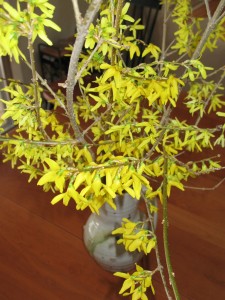Part of the pleasure of reading Henry Thoreau’s journals lies in their humdrum nature. Day after day, Thoreau gets up, goes about his day, takes his walk and records what he finds. He is, of course, an uncommon observer, but what he sees and hears each day is often common nature. Miraculous, yes, but there, everywhere, readily seen…if one will look.
On the first day of April, there is hum and drum to my walk as well. On my way to Fairhaven Bay via a loop around Walden Pond, I scuff the dry leaves and crunch over the last stretches of foot-beaten ice, ambling at an easy pace. The only hurried part of the world whistles by above the white pines; rumor of cold front is becoming word of arrival. The sky in the northwest is bruised.
But here at ground-level, where I live, the day is placid, and my middling mix of polar-tec top and shorts-clad legs seems the perfect arrangement. The pond, lightly-ruffled and glittering in its greens, is low, I note; the pondlet near the house site is separated from the main body by a dry ridge of ground. And, out in midpond, what look like small, rogue burgs of ice are really white-bottomed birds, too indistinct for my distance-fuzzed eyes to ID. Happily, given license, I deem them loons. Given kindreds, I walk on.
Beyond the pond, as I skirt the Andromeda Ponds, I hear my first chorus of spring; the peepers are singing sex; they are in riot along the eastern shores, where the direct afternoon sun slants in. I ease down near the swampy water, then close my eyes. The peepers insist; shrilling fills my ears; “hereherehereherehere…here,” they call, “here.”
Where else?
What, I wonder as I walk on, is this hatch of insects? Black, winged and many, they are little meteors across my sightlines; I inhale a few, wave aimlessly at others. Do they know the cold front is on the way? It is a one-day life. It is. Though the water-snake I come upon stretched out in a slat of sun is thumb-thick and, even in his spring torpor, he looks like forever.
And now, along the cliffy stretch just downriver from Fairhaven, the front arrives. A gray sheet of rain wavers in the air, and whitecaps leap on the river. Is that thunder, tentative, unsure of its season? Yes, rumble, yes. No hum now, only drum. Here, amid the flying water, I pull over to follow its suggestion. The wind, all the waters, the flying air, the river in tumult, it makes me want to laugh.
Then he does…the laughing bird. A long ahahahahahah issues from the pine above. Ahahahahahahahahahahah. There he is – pileated woodpecker. AHAHAHAHAHAHAHAHAHAH!


